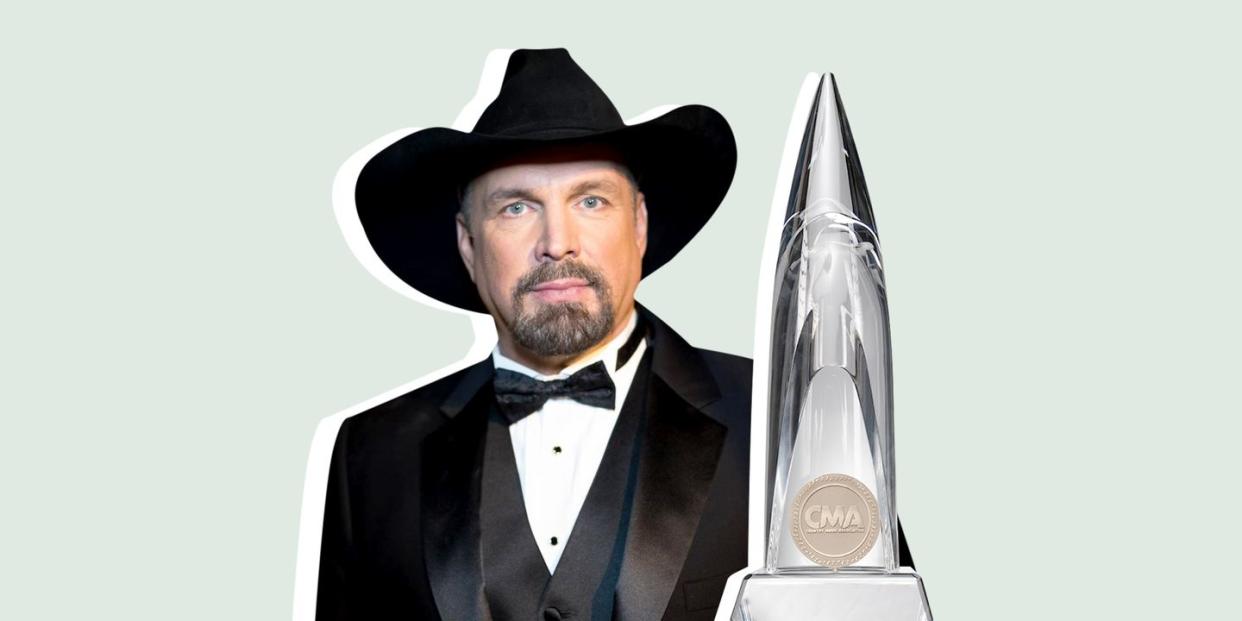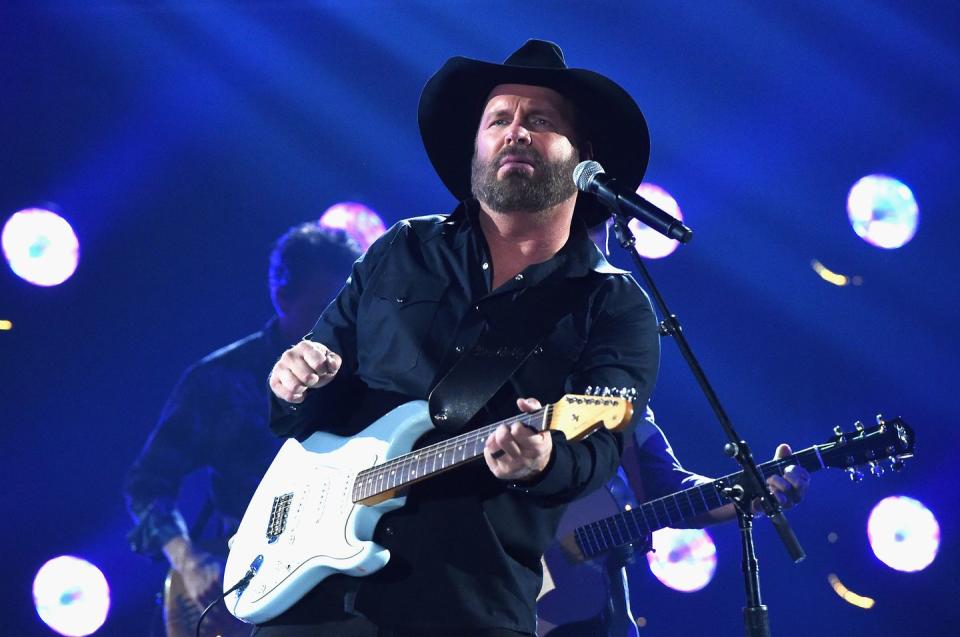Garth Brooks Doesn't Want the CMA's Highest Honor. That Won't Fix the Country Establishment's Problem.

On Wednesday, July 29, Garth Brooks announced in a press conference that he would be removing himself from contention for the Country Music Association's Entertainer of the Year award—a trophy he's taken home seven times. The trophy is, at least ideally, the ceremony's biggest honor: the physical representation of being the genre's "Best All Around," recognizing the power of touring, artistry, attitude, and general representation of the genre. The first time Brooks won in 1991, Brooks was setting the world on fire. The 1992 follow up was equally deserved, and in a bizarre turn for country music, he won in 1999, even though he spent that year as his pop-crossover alter ego Chris Gaines. (Long live Chris Gaines.)
But in four of the past five years, Brooks has only been nominated for Entertainer of the Year, and 100 percent of the time, he wins it. The reasoning is largely a mystery, considering that Brooks hasn't released new material since 2016. After last year's backlash when Brooks bested Carrie Underwood for the trophy, he has been feeling the burden of being the CMA's golden boy, saying, "There's one tweet in there that really stuck in my head. It said, 'Hey, man. This guy, why doesn't he just step down (and leave) the entertainer for the next generation?' 100% agree." Removing yourself from CMA contention is nice, even if it's not allowed, but Brooks' winning streak is less of a problem and more a symptom of the Country Music Association's preoccupation with rewarding legacy acts over younger musicians moving the genre forward.
No one has voiced that as publicly as Eric Church, whose frustration with Brooks' 2017 win still resonated a full nine months after the fact. Speaking to Rolling Stone, he said, "So the winner of the biggest category of the night lip-synced in the biggest moment on the show? Fuck that! And I didn’t like his excuse at all.” Brooks admitted to the artistic infraction, noting that his touring schedule was hectic. Church—often nominated, rarely awarded—was not buying the party line. “If I can’t sing, I won’t sing," he told Rolling Stone. "Or I’ll sing badly. But at least you’ll get what you get.”
The criteria for Entertainer of the Year award feels vague at best. On the Country Music Association's website, the organization lists the following as decision-making qualities in a nominee.
This Award goes to the artist. The Award is for the act displaying the greatest competence in all aspects of the entertainment field. Voter should give consideration not only to recorded performance, but also to the in-person performance, staging, public acceptance, attitude, leadership, and overall contribution to the Country Music image.
In recent years, it's hard to justify why Brooks would have won this award so many times, given the Association's own criteria. Yes, Brooks is a good poster boy for the hey-day of '90s country dominance, but it seems that this award has simply been handed out to the guy with the biggest tour. And not even that is accurate. Church had more profitable tours in 2017 and 2019. It would appear that Church doesn't fit the bill to win this award, simply because he's critical of the country music establishment.
But when it comes to being a good doobie for the mainstream country machine, it's hard to find someone more in line than Carrie Underwood. She is the reason that last year's controversy around the Entertainer of the Year award became so heated. After no female nominees for three years straight, Underwood was a near-lock for the award last year. She released a critically acclaimed album, embarked on a world tour while pregnant, made several television appearances, all the while carrying the torch for establishment country. She had the crossover potential, and most importantly, she never snarled at the larger country music machine that boasts male-driven stadium country over artistry in musicians like Brandi Carlile or Jason Isbell or Eric Church.
And yet, it still wasn't enough to topple Brooks. And when someone has every other quality that the Association looks for, it's hard to ignore the obvious injustice that the Country establishment is hesitant to award a woman with its highest honor. Like a 1950s sitcom, Underwood has been deemed qualified enough to host (for 11 years, mind you) but not to own the home. Underwood's perennial close calls feels strangely reminiscent of Reba McEntire's constant brush offs in the '90s. Or Dolly Parton's in the '70s. Mainstream country has always been clear that women should simply be honored to be in the room, let alone the stage. That leaves Brooks, the only remaining vestige of '90s good ol' boy vibes that this Association salivates over. The women who have managed to be in contention for this honor have only been able to do so through extraordinary circumstances that eclipse the traditionally male-driven arena of radio play. Reba McEntire, Carrie Underwood, Dolly Parton—the three hosts of last year's awards—aren't just country music acts. They're exceptional performers who dared to cross over into other genres, leverage national media, and work outside a system that gives preference to men.
Instead of changing the system or reevaluating what the criteria for "best all around" could mean, Brooks has removed himself from contention in a particularly strange year where touring is now a non-factor. Arguably, this would be an interesting year for Brooks to have won. His live CBS concert during quarantine was a pioneering moment for music this year, drawing in 6 million viewers. In a time when music has been paused, Brooks has kept constant contact with his fans via his Facebook page. But in this country music reality, we would have never known if the Association was awarding Brooks' innovation or if they were just bored again. Because Brooks has already been awarded so many times in such a predictable fashion, an award this year would have been another for the pile.

For years now, this awarding body has practically willed its antiquated status by chasing the high of yesteryear, throwing statues at the artist with the best greatest hits concert. It indicates that the Country Music Association isn't interested in moving forward. Garth Brooks embodies where the awarding body would like to remain: somewhere around 1993, in a male-dominated, honky tonk world where country is king.
While a Brooks concert remains one of the best shows in town, to say it's innovative is a stretch. Brooks' set pales in comparison to the performances of Miranda Lambert and Church, lacks the nuance of alt-country like Isbell and Carlile, and somehow overshadows the massive accomplishments of mainstream good girl, Carrie Underwood. But removing Brooks from contention doesn't change that. It opens the door for a back up placeholder. If the Association can find a way to exalt George Strait (or even the 2000s version of Brooks—perhaps Kenny Chesney or Brad Paisely) to the EoY throne, it will do that because the Country Music Association doesn't want to award country music's greatest innovations. It just wants to remember a time when country music—or rather, its favorite version of the genre—was more than a memory that lingers in the back of listeners' minds.
You Might Also Like

